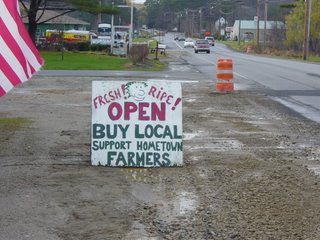 With the dawn of a new year, many Americans traditionally resolve to make changes in their lives, whether it be losing weight and getting in shape, vowing to complete that novel sitting in their desk drawer, or to live a life infused with more meaning.
With the dawn of a new year, many Americans traditionally resolve to make changes in their lives, whether it be losing weight and getting in shape, vowing to complete that novel sitting in their desk drawer, or to live a life infused with more meaning.While it would be great if all of us who are still seeking self-actualization could muster the momentum to move forward and maintain it say, on July 1st, the New Year makes for a laudable line of demarcation.
Taking stock of where we are and where we’d like to go isn’t a bad thing. Granted, there’s an entire industry that makes a living on this one day, but that doesn’t denigrate the value of using today to make small, positive changes heading into 2007.
While I have my own small changes I hope to make and yes, one of them is to lose some weight, via my new exercise program, here are some New Year’s resolutions I’d like to see Americans adopt, nationally. Granted, I can’t force these on anyone, as substantive change must be driven by personal motivations, rather than guilt. However, each one of my suggestions has solid evidence to support their consideration.
Getting the hell out of Iraq
The U.S. death toll sits precariously close to 3,000, with December being the deadliest month yet, for U.S. troops. After significant discussion, from a cross-section of U.S. leaders, with a combined experience that demands attention, George W. Bush still seems intent on doing things his own way. With his dubious track record and history of failure, “staying the course” seems like a ready made disaster for the U.S. military.
Americans need to muster the national will to demand we bring our troops home, now—rather than later! Our nation mobilized the political will in the past, forcing leaders, against their failed judgements, to leave Vietnam. We need that same effort now, as our current delusional president seems to lack the ability to read the writing—he’s now talking about a “sustained surge,” whatever the hell that oxymoron means.
A National Alternative Energy Policy
All one has to do is look at our December record temperatures, here in the Northeast, to know we’ve done some serious damage environmentally. As a nation, we had an opportunity, back in the 1970s, with oil embargoes and gas lines, to make substantive changes in the way we travel, heat our homes and produce electricity. Instead, like the proverbial ostrich, we placed our heads in the sands of denial and now, 30 years later, we have our backs against the wall.
With Al Gore’s movie, An Inconvient Truth, showing us where we need to go in formulating a national energy policy, the time is now to push for alternative energy, while there is still a smidgen of hope that we might be able to halt this march towards energy perdition. A call for a Manhatten Project for alternative energy should be the perogative of every one of the candidates running for office in 2008. For an idea of what this might look like, check out this site for Edwin Black's latest book, Internal Combustion.
A Government of the People, By the People and For the People
While most of my Democratic friends will continue to deny it, the Democrats are not the answer for America. We need a true third party in this country in the worst possible way. Both parties currently represent the interests of the elite one percent, to the peril of the remaining 99 percent of us. I know that it won’t happen in 2008, leaving us saddled with the sorriest of choices, if the current field of candidates is an indication—I’m frightened to see what other candidates throw their hats into the ring in the next 18 months, or so. Americans need to begin thinking about true political reform, if we have any hopes of truly turning things around.
With the recent passing of former president Ford, I’ve been reminded that America has faced other periods of weak and scandalous behavior at the highest levels and men have come along to restore dignity to the Office of President. While Ford wasn’t charismatic, or possessing a Hollywood persona, he did have a quiet humility and resolve that America needed in the post-Nixon era of the 1970s. Better yet, wouldn’t it be refreshing to have a real, live, breathing first lady again? Not some drugged-out zombie, like the current one, Laura Bush. Seeing some of the old news footage of Betty Ford’s speeches, particularly in light of the historical context, only highlights what a breath of fresh air (as well as controversial figure) she was, back in 1974.
Instant Runoff Voting is my hope for the future. It probably won’t make any headway this year, or even next, but possibly, by 2012, we could have some meaningful voting reform that would energize and make viable, third party participation in the electoral process.
Well, those are a few of my national prescriptions for 2007. Here’s wishing all my readers a healthy, prosperous and personally fulfilling New Year!














